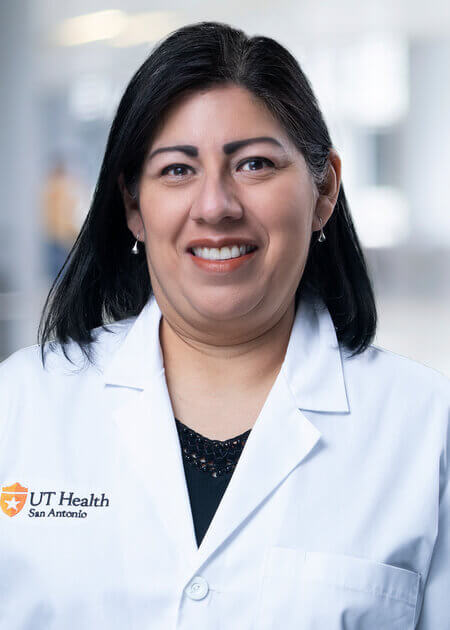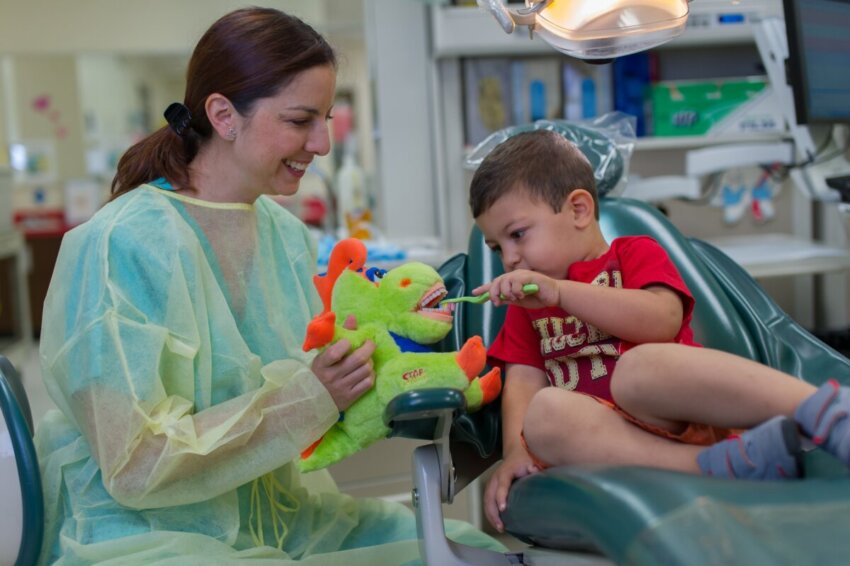Contact Steven Lee, 210-450-3823, lees22@uthscsa.edu
Content contributed by Kristen Zapata
SAN ANTONIO, Feb. 22, 2024 – Good dental hygiene starts early in life and its benefits extend beyond clean teeth and fresh breath. In fact, a consistent schedule of daily brushing, flossing and twice-a-year visits to a dentist can lead to better overall physical and cognitive health as well as higher self-esteem.
“There is a perception by some that because baby teeth fall out anyway, why treat them?” said pediatric dentist Claudia I. Contreras, DDS, who is also an assistant professor at The University of Texas Health Science Center at San Antonio School of Dentistry. “This thinking is harmful because hygiene habits start in childhood. Learning proper manners, hand-washing, bathing and brushing teeth all start in childhood — washing between your toes is as synonymous as flossing between your teeth.”

February is Children’s Dental Health Month, which acknowledges the importance of childhood oral care and its impact on the overall health and development of children. San Antonio Mayor Ron Nirenberg recently presented the UT Health San Antonio School of Dentistry with a proclamation of Children’s Dental Health Month in San Antonio and recognizing the school for its contribution to the community specifically for children’s oral health.
In its last Texas Oral Health Basic Screening Survey, the Texas Department of Health Services reported that nearly 53% of kindergartners and 67% of third-graders in Texas had experienced tooth decay. These statistics motivate Contreras to dispel misconceptions about dentistry for children and increase access to treatment. She said there are often painful and lifelong consequences for children whose teeth go untreated.
Oral health and physical development
Maintaining good oral health is crucial for a child’s physical and social development. It directly affects proper speech, eating and smiling, all of which contribute to social acceptance.
Teeth play a crucial role in enabling children to articulate sounds effectively while speaking. Certain sounds, such as ‘F’ and ‘S,’ are particularly influenced by the presence or absence of teeth, often causing challenges for some children. Many children begin combining words around their first birthday, which is when most dentists recommend they have their first dental visit.
The tongue and back molars are vital instruments for eating and nutrition. When working well together, a child can push food around the mouth, breaking it down for easy swallowing. If dental discomfort disrupts this process, a child may struggle to chew properly or restrict the types of food they eat, potentially leading to nutritional deficiencies over time.
The ability to speak clearly and eat properly is associated with a child’s ability to socially interact, forming the foundation for effective communication and positive relationships. A healthy smile also boosts confidence and contributes to a child’s overall well-being. It promotes a positive self-image and social acceptance.
Oral health and cognitive health
The pain, discomfort and embarrassment that often accompany dental diseases, including cavities, can negatively impact cognitive development and self-esteem, affecting daily life.
Cognitive development, the process of learning and acquiring knowledge, may be disrupted if dental pain or infection leads to missed school days. Research indicates that children are three times more likely to miss school and four times more likely to have a lower grade point average due to dental-related pain than any other illness.
Dental discomfort hinders a child’s ability to concentrate. Persistent or increasing tooth pain resulting in missed school, creates a cycle of missed educational opportunities that negatively affects academic performance.
The consequences of poor school performance extend beyond academics, potentially causing feelings of shame or inadequacy in children. It can also negatively influence social acceptance and contribute to lowered self-esteem.
“Cavities can turn into infections, infections into abscesses, abscesses into something even more serious, such as cellulitis,” Contreras said. “These are real consequences of untreated teeth. It’s hard for parents to see their children in pain, so it’s important to prevent it.”
Compassion in dentistry

Contreras practices what she teaches to her students.
“We’re not here to punish or point the finger at patients or parents of children experiencing dental issues,” she said. “Dentists, especially pediatric dentists, are meant to find new ways to inspire their patients to better care for their oral health. I teach my students that it is not our job to be accusatory but to give positive feedback, to tell our patients what they are doing well and encourage that.”
Yun Shi and Kevin Hakala experienced this firsthand after entrusting Contreras with their daughter Ashling’s dental care after she injured a tooth at the age of two. Five years later, Ashling has a healthy, permanent one growing in its place.
“We have been taking Ashling at least twice a year to see Dr. C for checkups,” Shi said. “She had quite a few cavities when she was five that required treatment, but Dr. C helped identify some changes in her teeth and we are all paying more attention at home. Dr. C answers all our questions. She also uses each opportunity to educate us parents about oral health.”
In describing his daughter’s comfort level at the dentist’s office, Hakala said, “Ashling will often bring a drawing or colored picture for Dr. C when she goes for a visit. They have a great relationship.”
Ashling was quick to confirm that.
“She has been so sweet to me,” she said. “She makes me so happy and she always makes my teeth clean … she is the best dentist I have ever seen in the world.”
“Patients who come in for an appointment after missing many years or those coming in for the first time can expect compassion and understanding from their dentists, not judgment,” Contreras said. “We are here to work with families and teach them the habits that will prevent future problems.”
Contreras stressed the importance of making parents aware of the many affordable pediatric dental clinics in San Antonio and South Texas, including:
- UT Dentistry’s Pediatric Dental Clinic.
- Pediatric Dental Clinic at the Ricardo Salinas Health Center.
- UT Dentistry Laredo Dental Clinic.
For help scheduling your child’s next dental appointment, call UT Dentistry at 210-450-3500.
The University of Texas Health Science Center at San Antonio (UT Health San Antonio), a primary driver of San Antonio’s $44.1 billion health care and biosciences sector, is the largest academic research institution in South Texas with an annual research portfolio of $413 million. Driving substantial economic impact with its six professional schools, a diverse workforce of more than 8,500, an annual expense budget of $1.46 billion and clinical practices that provide 2.6 million patient visits each year, UT Health San Antonio plans to add more than 1,500 higher-wage jobs over the next five years to serve San Antonio, Bexar County and South Texas. To learn about the many ways “We make lives better®,” visit UTHealthSA.org.
The UT Health San Antonio School of Dentistry offers 18 degrees and programs in both dentistry and dental hygiene, world-renown faculty educators, a diverse student population, state-of-the-art clinical facilities and a distinguished research enterprise. Departments include comprehensive dentistry, developmental dentistry, endodontics, periodontics, and oral and maxillofacial surgery. Scientists collaborate with clinicians and research teams worldwide, and work across multiple medical and dental disciplines to find new treatments, advancing knowledge of oral health, biomaterials, cancer, pain and more. To learn more, visit https://www.uthscsa.edu/academics/dental.
Stay connected with The University of Texas Health Science Center at San Antonio on Facebook, Twitter, LinkedIn, Instagram and YouTube.


